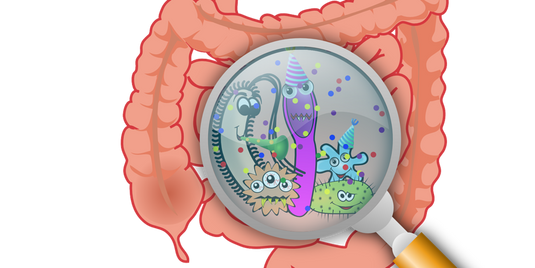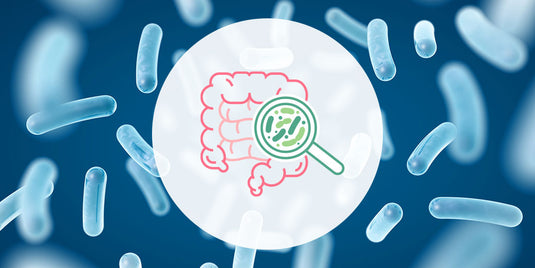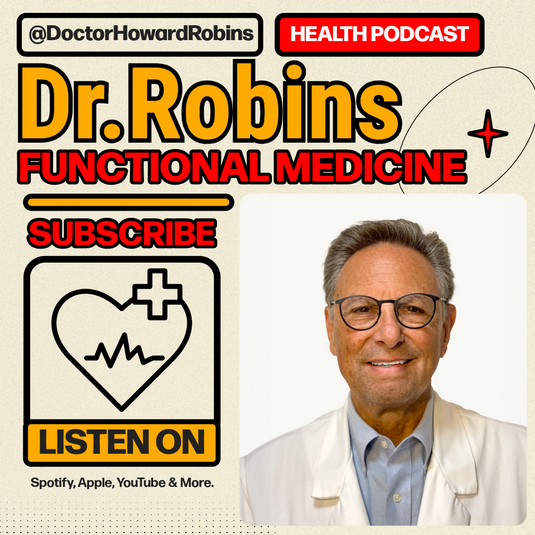The gut microbiome or microbiota is the total number of living microorganisms present in your GI tract, which includes bacteria, viruses, protozoa, and fungi, and their collective genetic material. We carry an estimated amount of 4 ½ pounds of microbes.
One third of our gut microbiota is common to most people, while two thirds are specific to each one of us. Although the general composition of microbiota is similar in most healthy adults, the species composition is highly personalized and predominantly influenced by our environment and our diet.
Everyone’s microbiome is unique, but it always fulfills the same functions, which directly impacts our health.

5 Important Functions of the Gut Microbiome
[1] Helps the body to digest certain foods that the stomach and small intestine cannot digest.
- Some types of gut bacteria have enzymes we lack to break down certain carbohydrates- starches, fibers, and sugars such as lactose.
[2] Helps with nutrient and mineral absorption.
- Can synthesize vitamin K and B group vitamins including folate and biotin.
- Can facilitate the absorption of dietary minerals such as calcium, magnesium, and iron.
[3] Acts as a defense against unhealthy and/or harmful microorganisms.
- Gut microbiota forms a protective barrier on your intestinal wall to prevent harmful bacteria from entering your bloodstream.
- Healthy bacteria compete against unhealthy bacteria for space and nutrients, thereby suppressing its growth.
- Secrete compounds that kill or inhibit harmful microbes or pathogens.
[4] Plays an important role in the immune system.
- Helps the immune system respond to pathogens.
- Some species of bacteria can signal the immune system to drive an anti-inflammatory response to help eliminate harmful bacteria.
[5] A healthy and balanced gut microbiota is key for healthy digestion.
- When harmful microorganisms take over our gut, we may experience bloating, constipation, diarrhea, gassiness, and cramping. If the gut does not maintain a healthy balance of healthy bacteria, this discomfort may develop into more serious complications and disorders.
Your gut microbiota plays an important role in your metabolism. Gut bacteria affects the number of calories you get from food and the nutrients you draw from it. Too much gut bacteria can turn fiber into fatty acids, which may cause fat deposits in your liver. This can lead to type II diabetes, heart disease, and obesity.
According to the CDC, more than a third of adults in the U.S. are obese. This epidemic has led to a significant increase in research, especially on the topic of how the gut microbiota is linked to the risk of obesity. Medical News Today reported on a study showing how our weight may be affected by our genetic makeup, which in part determines what types of bacteria reside in our gut.
Most researchers agree that a wide diversity of bacteria in our gut is better for our overall health. One study reported that infants with less diverse gut bacteria at the age of 3 months were more likely to develop allergies to specific foods such as milk, peanuts and eggs.
Many new studies are analyzing the association between the gut microbiome and weight gain. Some suggest that the composition of bacteria in your gut may directly influence your susceptibility to weight gain.
Prof. Tim Spector of King's College London said, "our findings show that specific groups of microbes living in our gut could be protective against obesity and that their abundance is influenced by our genes. The human microbiome represents an exciting new target for dietary changes and treatments aimed at combating obesity."
Another study in the Journal of Proteome Research said that a lack of bacteria in the large intestine may slow down the activity of brown fat, which burns more calories and protects against obesity.
Another study gave evidence that a patient who was given a fecal transplant from an obese donor rapidly became obese after the treatment.
While there is still much research to be done on whether there is a direct link between the gut microbiome and obesity, it is evident that maintaining a healthy amount of living “friendly” bacteria is essential in supporting normal digestion.
How can probiotics help?

Probiotics are living, good bacteria that have a multitude of benefits that can be easily incorporated into your daily diet.
- Can aid in rebalancing the gut microbiome to support healthy digestive function.
- Can promote the growth of good bacteria, which may help to increase your body’s defense against harmful microorganisms.
- Can aid in the production of vitamins, which helps enhance nutrient and mineral absorption.
Doctor’s Biome offers 15 of 17 strains of probiotics in a daily dose to help you restore digestive function and stimulate healthy metabolism.


![THE DOCTOR’S BIOME® DIFFERENCE [We Have the Smarts and the Charts]](http://doctorsbiome.com/cdn/shop/articles/DB_Difference_Infographic_27fc57ba-5eda-489e-b6d1-45f50e7c49a8_535x.jpg?v=1748981561)

